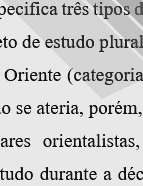

In short, in the nineteenth century, scholars of Oriental studies were responsible for fostering and maintaining a transnational network of both indirect and direct exchanges, the former being based on intense epistolary activity, while the latter relied, for the most part, on participation in scientific conferences, as well as on study trips and field studies. All of these exchanges helped to solidify a more continuous and fertile framework of knowledge production about Asia and the Orient in general. The scientific societies and associations – both public and private – which, from the last quarter of the eighteenth century, were founded throughout Europe in line with the scientific and political orientations of various national governments, played a fundamental role, not only in supporting the activities of orientalists, but also in stimulating specialized education. In Portugal there are two paradigmatic examples of this kind of institution: the Royal Academy of Sciences of Lisbon, founded in the spirit of the Enlightenment in 1779, and the Curso Superior de Letras, which this academy helped to create in 1859, becoming its primary patron. Founded in 1875 by a group of figures from the Portuguese cultural and intellectual scene under the initiative of Luciano Cordeiro, and boasting the support of the government thank to the mediation of Andrade Corvo, the Lisbon Geographical Society was led with a more obviously politicized agenda and focused, above all, on the Portuguese presence in Africa. As mentioned above, in 1906 it sponsored the creation of the Colonial School, which would later change its name to the Escola Superior Colonial [Higher Colonial School] in 1926, and then again to the Institute of Social and Political Sciences in 1974. The society was organized into two working committees, one African, the other Asian, each corresponding to the geographical spaces of Portugal’s territorial possessions, and it was through this organization and the initiatives that it promoted, including the financing of expeditions in Portuguese Africa and India, and the subsidizing of scientific exchange, that the government aimed to strengthen the Portuguese colonial apparatus. Both institutions developed their own systems of communication with wider society and their own ways of circulating the knowledge that they produced, mainly through specialized publications – scientific journals and serials (such as Monumentos Inéditos para a História das Conquistas dos Portugueses em África, Ásia e América [Unpublished Records to the Portuguese Conquests in Africa, Asia and America] promoted by the Academy of Sciences between 1858 and 1935) – and bibliographical exchanges with institutions beyond the nation’s borders.
Even so, Portugal was far from enjoying the same conditions as the great European centres of Orientalist studies. If in 1874, Vasconcelos Abreu’s enthusiasm led him to call the hosts of Portugal towards progress, by 1892 this enthusiasm had wilted and been replaced by dejection, with the Sanskritist lamenting that a scientific milieu capable of fomenting the development of Oriental studies “still has not formed among us” (Passos dos Lusíadas, 1892, p. III). The lacking work conditions, the inadequacy of bibliographical and museological collections, and the scarcity of financial subsidies that determined the country’s delay in relation to its European neighbours were constantly referenced in Portuguese discourse about the nation’s place in the European map of Oriental studies.
